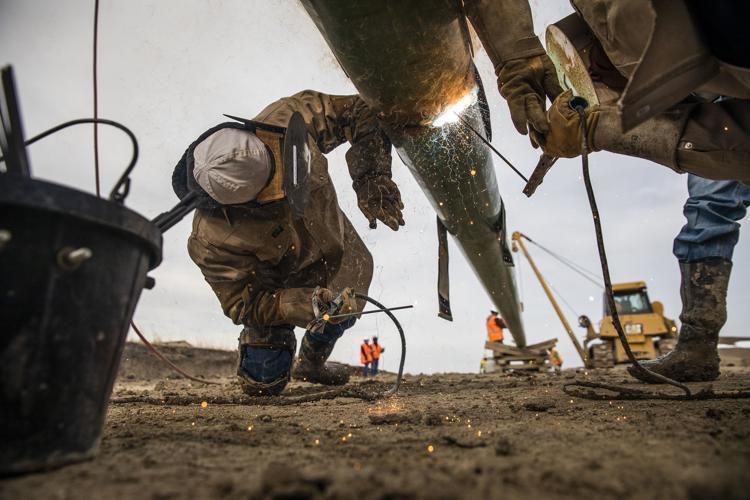Wyoming Judge Gives Break in Energy Royalties

By Camille Erickson
October 15, 2019 - A tug of war over contested federal mineral royalty rates played out in the courts between energy groups and the Interior Department again last month. This time, a Wyoming court ruled in favor of the coal industry by partially blocking the 2020 launch of an Obama-era policy, known as the valuation rule.
The valuation rule sought to update the methods the Interior Department uses to calculate mineral royalty rates. Under the new rule, royalty payments are based on the market rate of extracted minerals.

Welders join sections of pipe in March outside Douglas while working to construct a new natural gas liquids pipeline for Meritage Midstream in March.
Photo by Star-Tribune
But the modified royalty system has come under fire from energy companies. According to its critics, the valuation rule restricts economic development and creates “substantial and unnecessary burdens” for operators. Complying with the new valuation rule would require companies to dish out more cash for extracted minerals in addition to paying for the implementation of new software and personnel to retroactively calculate past royalty payments, petitioners said in court documents.
The U.S. District Court of Wyoming announced Tuesday it would grant a preliminary injunction on the application of the new rule, as it applies to coal production. The decision partially granted and partially blocked the valuation rule as the court considers the case in full. The decision followed an evidentiary hearing held Sept. 9 in Wyoming. The judge handed the coal industry — saddled with paying full market price for the extracted minerals under the new rule — a temporary win. In his decision, U.S. District Judge Scott Skavdahl reasoned the valuation rules could cause “irreparable harm” to the coal mining industry. However, the judge did not find merit in the arguments made by the petroleum sector against the rule. Ultimately, his decision allows the Interior Department to uphold the new royalty standards for oil and gas operators.
Several environmental groups, including the Wilderness Society, came out to intervene in the lawsuit.
“I think it is fair to say and that the new 2016 Office of Natural Resources Revenue valuation rule as it relates to oil and gas as well as coal, will lead to greater collection of royalties. And so now with some of the elements of the rule being enjoined there is likely going to be less money coming in ... and less money being transferred to the government as part of royalties,” said Bruce Pendery of the Wilderness Society.
This is not the first time the valuation rule has come before a judge, though.
Last month, Cloud Peak Energy, along with other companies, objected to the 2016 changes to the valuation rule that make industries pay full dues after extracting publicly owned minerals. Plaintiffs moved the case to Wyoming. The lawsuit against the valuation rule was filed July 19 in Wyoming.
The companies filed lawsuits against the Interior Department in response to an April ruling from a federal California court striking down the Trump administration’s delay and eventual repeal of the valuation rule.
U.S. District Judge Saundra Brown Armstrong in California deemed the Office of Natural Resources’ decision to repeal the rule “arbitrary and capricious” and reinstated the valuation rule. The administration did not provide sufficient reasoning for the rollback of the rule, she concluded.
Before 2016 revisions were made to the valuation rule, companies would sometimes use affiliate companies to sell minerals at deflated prices, often skirting higher royalties associated with selling resources at market value. The Obama-era rule required companies to pay market value price on royalties after extracting minerals on federal and tribal land.
The Obama administration buffed up the royalties policy in an effort to halt the practice of avoiding higher royalty payments, by requiring companies pay mineral taxes at full market value. The new rule went into effect in 2017.
Taxpayers for Common Sense, a nonpartisan organization advocating for taxpayers, applauded the California judge’s reinstatement of the valuation rule in April, calling the ruling “a welcome result that will mean more royalty revenue collected for oil, gas and coal produced from federal lands and waters.”
The administration estimated the change would bring in between $71.9 million and $84.9 million in additional royalties to the government. Last year, Office of Natural Resources Revenue raked in $7.2 billion in federal royalties.
But the Trump administration’s decision to issue a rule wiping out the 2016 valuation rule gave energy companies mining for coal or drilling for oil and gas on federal land a financial break that harmed taxpayers’ pockets, the group argued. About 48 percent of these federal royalties wind back to Wyoming’s state budget.
This decision comes as the Bureau of Land Management announced Wednesday it would curtail the royalty rates and rental fees for the extraction of non-energy minerals, including soda ash.
“Wyoming is home to large deposits of soda ash, and the exploration, development and production of this commodity is done under state-of-the-art industrial, labor and environmental standards,” Gov. Mark Gordon said in a statement. “A reduction of the federal royalty rate to two percent is essential to the long-term global competitiveness of the soda ash industry. This proposed rule will protect jobs in both Wyoming and other states in the industry supply chain and will also enable strategic capital investment for future growth and job creation.”

